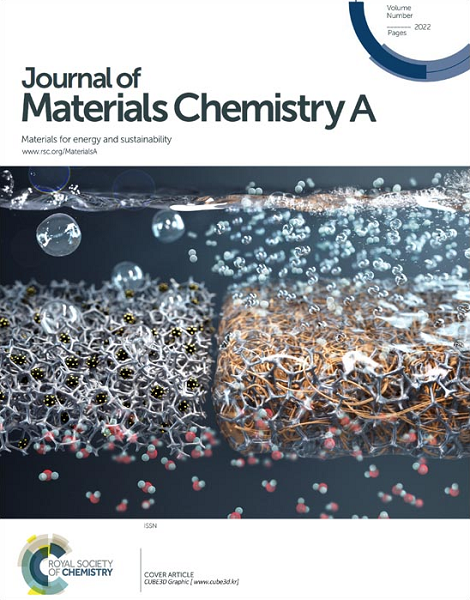Linkage engineering regulated π-conjugated covalent organic frameworks (COFs)-based anode for high-performance LIBs
IF 10.7
2区 材料科学
Q1 CHEMISTRY, PHYSICAL
引用次数: 0
Abstract
COFs have garnered widespread attention and demonstrated significant potential in energy storage and conversion, attributed to their predesigned structures, high surface areas, and excellent stability. However, designing and preparing COFs with high-performance Li-ion storage capabilities among different types of linkages remains challenging. In this work, we synthesized two types of COFs with distinct linkages through linkage engineering. The COFs@BOA, incorporating oxazole linkages, and COFs@IM, incorporating imine linkages, both exhibited fine crystallinity and stability. Due to the semiconductor properties of the COFs, we employed an in-situ growth approach to deposit the COFs onto the surface of carbon nanotubes. The resulting COFs@BOA-30 and COFs@IM-30 composites demonstrated highly reversible capacity, with the latter exhibiting a superior capacity of up to 1100.3 mAh g-1 under 100 mA g-1. The capacity contribution of COFs@IM was calculated to be 1696.0 mAh g-1 in the COFs@IM-30 composite, while COFs@BOA contributed only 925.8 mAh g-1. DFT calculations suggest that the discrepancy in capacities may be attributed to the lower LUMO-HOMO gap of COFs@IM. Additionally, electrical conductivity measurements indicate that COFs@IM has better conductivity than COFs@BOA, highlighting the superior performance of COFs@IM. This study underscores the significance of linkage engineering in designing COFs to improve the performance of organic electrodes in LIBs.连接工程调节π共轭有机框架(COFs)为基础的高性能 LIB 负极
COF 因其预先设计的结构、高比表面积和出色的稳定性,在能量存储和转换方面获得了广泛关注并展现出巨大潜力。然而,设计和制备具有高性能锂离子存储能力的不同连接类型的 COFs 仍具有挑战性。在这项工作中,我们通过连接工程合成了两种具有不同连接方式的 COFs。含有草唑连接的 COFs@BOA 和含有亚胺连接的 COFs@IM,都具有良好的结晶性和稳定性。由于 COFs 具有半导体特性,我们采用了原位生长法将 COFs 沉积到碳纳米管表面。由此产生的 COFs@BOA-30 和 COFs@IM-30 复合材料显示出高度可逆的容量,后者在 100 mA g-1 下显示出高达 1100.3 mAh g-1 的超强容量。根据计算,COFs@IM-30 复合材料中 COFs@IM 的容量贡献为 1696.0 mAh g-1,而 COFs@BOA 的容量贡献仅为 925.8 mAh g-1。DFT 计算表明,容量差异可能归因于 COFs@IM 的 LUMO-HOMO 间隙较低。此外,电导率测量结果表明,COFs@IM 的电导率优于 COFs@BOA,凸显了 COFs@IM 的卓越性能。这项研究强调了连接工程在设计 COFs 以提高 LIB 中有机电极性能方面的重要意义。
本文章由计算机程序翻译,如有差异,请以英文原文为准。
求助全文
约1分钟内获得全文
求助全文
来源期刊

Journal of Materials Chemistry A
CHEMISTRY, PHYSICAL-ENERGY & FUELS
CiteScore
19.50
自引率
5.00%
发文量
1892
审稿时长
1.5 months
期刊介绍:
The Journal of Materials Chemistry A, B & C covers a wide range of high-quality studies in the field of materials chemistry, with each section focusing on specific applications of the materials studied. Journal of Materials Chemistry A emphasizes applications in energy and sustainability, including topics such as artificial photosynthesis, batteries, and fuel cells. Journal of Materials Chemistry B focuses on applications in biology and medicine, while Journal of Materials Chemistry C covers applications in optical, magnetic, and electronic devices. Example topic areas within the scope of Journal of Materials Chemistry A include catalysis, green/sustainable materials, sensors, and water treatment, among others.
 求助内容:
求助内容: 应助结果提醒方式:
应助结果提醒方式:


